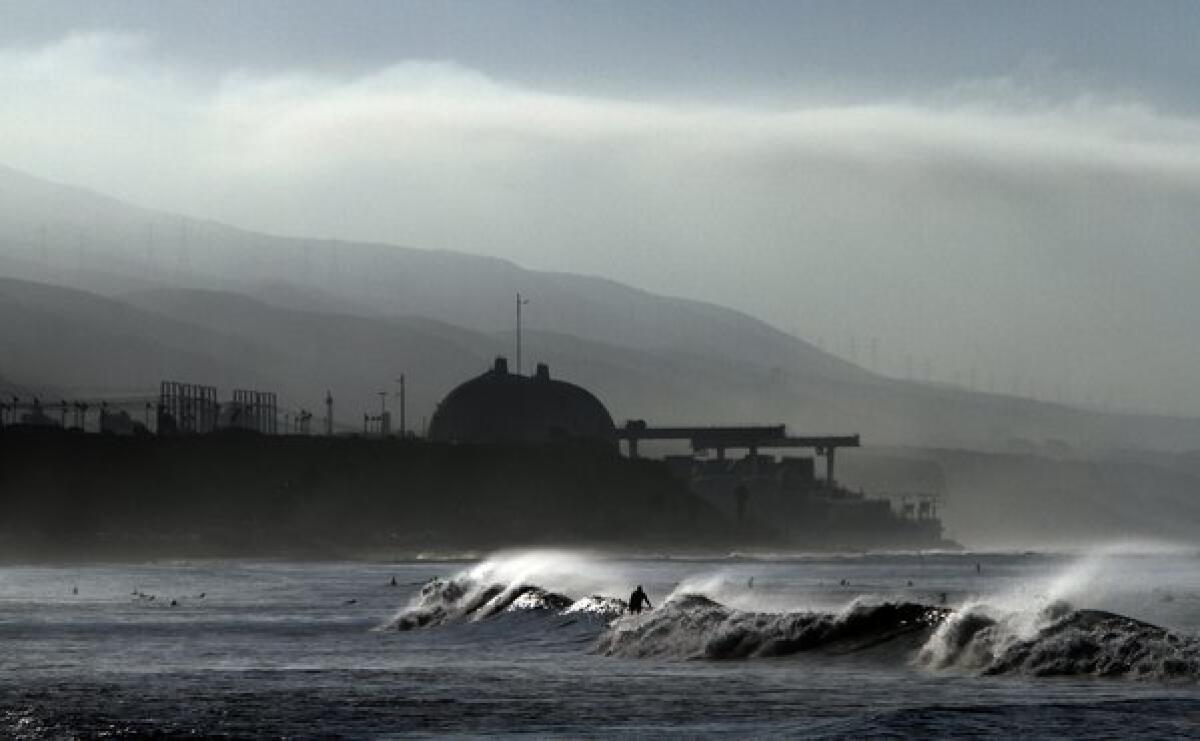Edison, Mitsubishi hit roadblock on San Onofre’s future

- Share via
A flurry of letters that went back and forth between Southern California Edison and Mitsubishi Heavy Industries late last year reveal the serious hurdles that stand in the way of the San Onofre nuclear power plant’s long-term future.
The plant had been offline at that point for nearly a year because of unusual wear on tubes that carry radioactive water in the plant’s newly replaced steam generators, which were designed and manufactured by Mitsubishi.
Edison asked federal regulators in October for permission to restart one of the plant’s two units and run it at 70% power for a few months to see if that would alleviate the conditions that led to the wear.
But the company was pushing for Mitsubishi to develop a plan that would allow both units at the plant to return to service at full power for the 40-year intended life span of the steam generators.
By the end of 2012, however, the companies had not been able to come to an agreement on a feasible plan.
Mitsubishi recommended installing thicker support bars to prevent the tubes from vibrating. The plan could have been implemented in about a year, but according to a letter sent by Mitsubishi, Edison rejected it.
Other options Mitsubishi presented included replacing the entire bundles of more than 9,000 tubes in each of the plant’s four steam generators or replacing the steam generators completely. Either of those options, Mitsubishi said, would take more than five years.
The documents did not give a cost estimate for the various options. Replacing the steam generators the last time around cost $768.5 million.
The letters were released as part of an examination by the California Public Utilities Commission of the costs of the plant’s outage.
In a Nov. 28 letter, Edison Vice President Pete Dietrich wrote to Kiyoshi Yamauchi, chief executive director of Mitsubishi Nuclear Energy Systems, “The failure of the steam generators to work properly has seriously harmed SCE and our stakeholders, and we hope that MHI will recognize that it is in its interest to accept full responsibility for these impacts.”
He asked Mitsubishi to submit a plan by Dec. 28 to return “within a short time frame, all four steam generators to service at 100% rated electrical power.”
Mitsubishi responded that the type of tube wear seen at San Onofre had never been seen before in an operating steam generator, making the analysis more time consuming.
The company said it had done studies and mock-up tests of various repairs to the support structures between April and September 2012 and concluded that adding thicker anti-vibration bars would be a “practical and viable” option.
“I am disappointed that it appears that MHI does not have a repair plan despite the passage of many months,” Dietrich responded in a Dec. 19 letter. “We appreciate the efforts you are making, but the contract requires that an actual repair or replacement occur.”
In a Dec. 20 letter, Mitsubishi noted that Edison had rejected the proposal to install thicker anti-vibration bars, but did not say why.
Edison vice president of engineering Tom Palmisano said during a hearing Wednesday that he could not say for sure that Edison had rejected the plan, but that the company did question whether it would effectively restore the steam generators to full service.
It was unclear whether Mitsubishi had since presented another plan.
Ratepayer advocates, who are arguing that customers should not have to pay for the plant’s problems, questioned why Edison had rejected the quickest and most cost-effective option and why the company was pushing for a restart at partial power when it had no long-term plan.
“Edison has no plan, and the 70% restart proposal for Unit 2 is a path to nowhere” said John Geesman, an attorney for the Alliance for Nuclear Responsibility.
In recent weeks, Edison officials have signaled that they may decide by the end of the year to retire the plant permanently -- something that a number of groups have been pushing for, saying the plant is unsafe -- if they don’t get the go-ahead to restart at partial power.
NRC Chairwoman Allison Macfarlane said Tuesday that the agency will make no decision on the restart proposal until late June at the earliest.
The process could take longer if Edison is required to go through a series of trial-like public hearings before a restart decision.
ALSO:
Kern County sheriff ‘cannot speculate’ on deputies’ actions
‘Most vicious’ L.A. leads nation in dog attacks on postal carriers
Leila Fowler’s brother charged with murder: He’s ‘quiet and reserved’
Twitter: @sewella
More to Read
Sign up for Essential California
The most important California stories and recommendations in your inbox every morning.
You may occasionally receive promotional content from the Los Angeles Times.











